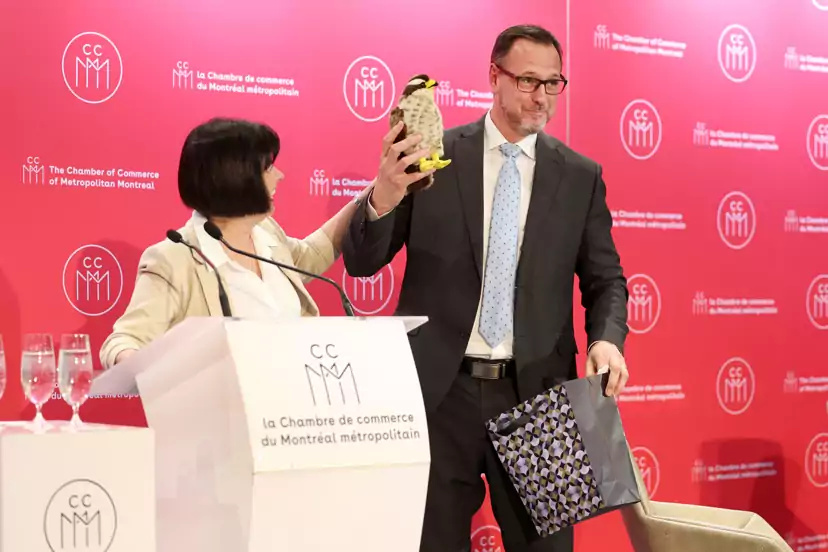The climate was in harmony Monday between Quebec and Ottawa in a file, that of the place of French, where the two governments were generally at loggerheads.
The meeting between Ginette Petitpas Taylor, Federal Minister for Official Languages, and her counterpart Jean-François Roberge, Minister for the French Language and Minister responsible for Canadian Relations and the Canadian Francophonie, gathered on the same platform by the Montreal Chamber of Commerce metropolitan to address the issues of French in the metropolis, had almost “love-in” accents.
“We can sometimes have disagreements, but one thing I would like you to remember today is that we share a common objective, that of protecting and promoting French throughout the country, including in Quebec” , launched Minister Petitpas Taylor.
Ms. Petitpas Taylor also presented Mr. Roberge with a stuffed peregrine falcon, symbol of a species whose status has changed from threatened to vulnerable, as a gesture of recognition.
For his part, Minister Roberge said he was “very happy” to share this platform with “Ginette”.
“We’ve been doing something special, Ginette and I, lately,” he said. We surprised people, I think, by working in a real effort of collaboration and consultation. Much of the credit goes to him because finally, we have an asymmetrical vision. What that means, in reality, is that we are changing the paradigm. »
Ottawa’s decision to recognize for the first time that French is threatened in Quebec, not just in the rest of Canada, is behind this change.
“They recognized that French is in decline even in Quebec,” Roberge said. It is majority and vulnerable. This is a documented statistical fact. But politically, it still took a lot of leadership to say it, to name it, to have it included in the Official Languages Act. »
“We had ruts that told us that for Quebec to win, the federal government had to lose […] and for the federal government to win, Quebec had to be on its knees. This is no longer true. We managed to do something that is win-win. »
Mr. Roberge argued in favor of the passage of federal Bill C-13, in its current version “with its references to the Charter of the French language”. “Not in a washed-out version,” he said.
C–13, which aims to modernize the Official Languages Act, could be adopted at the end of June.
This bill proposes targeted measures to reverse the decline of French, a trend that is “very, very concerning,” according to the minister, who recently announced an action plan to promote and protect the country’s official languages, with investments of 4.1 billion which will be used in particular to increase the share of Francophone immigration.
“We will need much higher Francophone immigration targets outside Quebec,” insisted Jean-François Roberge, who continued by talking about immigration thresholds, which remain a point of contention between the two governments.
For his part, the President of the Chamber, Michel Leblanc, recalled the importance of offering better francization programs to newcomers in the city, by focusing on people in the field.
“People who work hard, who have just arrived sometimes with children, families or wives or husbands who have to integrate, we have to make their lives easier,” he said, in a scrum of press, after the meeting with the two ministers. “That’s really the lesson. If we blame the immigrant, we lose sight of the fact that our system is probably not accommodating enough for their schedule, for their reality, so it’s up to us to do the extra to make it easy. »
Jean-François Roberge recognized the problem and said that the implementation, on June 1, of the single window “Francisation Québec” would offer solutions. The Minister of Immigration, Francisation and Integration, Christine Fréchette, is to announce the details shortly.
Adoption of Bill 96 which reinforces the Charter of the French language and affirms that French is the only official language of Quebec.
Data from the 2021 census on language show a decline in the demographic weight of Francophones in Quebec and Canada.
Tabling by Ottawa of Bill C-13 on official languages which recognizes the Charter of the French language.
Unveiling by Ottawa of a five-year, $4.1 billion plan to support official languages and especially French.





















